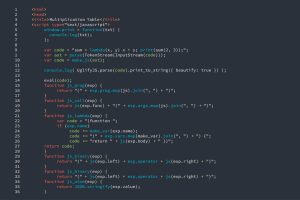Within the ever-evolving scene of programming ideal models, Functional programming stands out as a breath of new discuss. It’s not fair a coding fashion; it’s a reasoning that energizes effortlessness, unchanging nature, and unadulterated capacities. This article will take you on a travel into the captivating world of Functional programming, investigating its center concepts, benefits, and why it’s picking up force among designers around the world.
Understanding Functional Programming:
Functional programming, regularly named FP, spins around treating computation as the assessment of numerical capacities and dodging changing-state and changeable information. In FP, capacities are first-class citizens, meaning they can be passed around like factors and utilized as contentions in other capacities. This worldview empowers a explanatory approach, where you characterize what ought to be done, instead of how to do it.
Key Concepts:
- Unadulterated Capacities: These capacities continuously create the same yield for the same input and have no side impacts, making them unsurprising and simple to test.
- Unchanging nature: In FP, once information is made, it cannot be changed. Rather than adjusting existing information, you make unused information, advancing more secure and more unsurprising code.
- Higher-Order Capacities: Capacities that can take other capacities as contentions or return them. This concept empowers effective deliberations and code reusability.
- Recursion: Useful programming dialects depend intensely on recursion rather than circles for tedious assignments, emphasizing the significance of self-referential capacities.
Benefits of Functional Programming:
- Readability: With its center on straightforwardness and permanence, FP code tends to be brief and simple to examined, lessening the chances of bugs.
- Concurrent and Parallel Programming: FP’s unchanging nature and immaculate capacities make it intrinsically reasonable for concurrent and parallel programming, driving to proficient utilization of present day multi-core processors.
- Testability: Immaculate capacities and unchanging nature make testing less demanding since capacities are disconnected units without conditions on outside state.
- Versatility: Useful programming makes a difference oversee complexity, making it easier to scale applications as they develop in estimate and complexity.
Functional Programming in Action:
Consider a situation where you would like to calculate the entire cost of things in a shopping cart. In a useful worldview, you’d utilize higher-order capacities and unchanging nature to attain this, coming about in clear, brief, and viable code.
const cart = [
{ item: 'Laptop', price: 800 },
{ item: 'Mouse', price: 20 },
{ item: 'Keyboard', price: 50 }
];
const calculateTotal = cart => cart.reduce((total, item) => total + item.price, 0);
console.log(`Total price: $${calculateTotal(cart)}`);
Functional programming isn’t fair a slant; it’s a worldview move that empowers engineers to think in an unexpected way around tackling issues. By grasping straightforwardness, permanence, and unadulterated capacities, software engineers can compose strong, versatile, and clear code. As you dive into the world of useful programming, keep in mind that it’s not fair a coding fashion; it’s a attitude that can change the way you approach program development.
So, why not set out on this energizing travel? Grasp Functional programming, rearrange your code, and open a unused domain of conceivable outcomes within the ever-expanding universe of computer program improvement.




